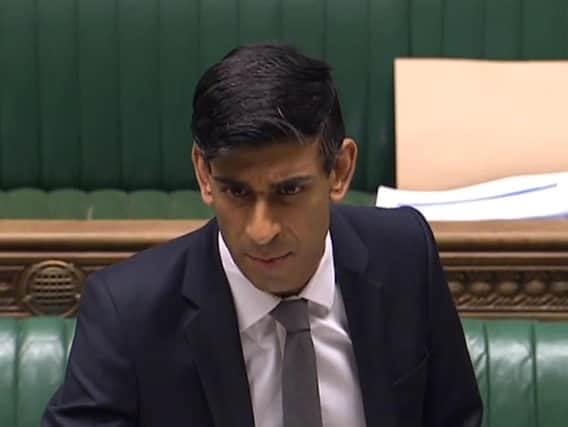Misuse of Bounce Back Loans scheme could lead to prosecution for fraud, owners are warned


Analysts have warned that some business owners may have taken out Bounce Back Loans when technically insolvent.
Richard Simms, the managing director at FA Simms & Partners, which has an office in Leeds, said, the loans, which were announced by Chancellor Rishi Sunak, provide essential support for businesses affected by the coronavirus pandemic.
Advertisement
Hide AdAdvertisement
Hide AdMr Simms added: “There are some hidden pitfalls and HM Treasury have clearly warned that any misuse of the scheme could result in prosecution for fraud.
“Beyond the attention-grabbing headlines of those tempted to splash it all on fast cars, there are others who are about to unwittingly store up trouble for themselves further down the line by doing what they think is the right thing.
“Many may well be tempted to use the loan to pay down company debt to get landlords and creditors off their back for a while,’’ said Mr Simms.
“This sounds reasonable but what they may not realise is that, if their company is already in an insolvent position - many are without knowing it - there are strict rules about the order in which creditors are paid.
Advertisement
Hide AdAdvertisement
Hide Ad“If paid in the wrong order, directors may well open themselves up to investigation, they may be prevented from striking their company off at a later date and they may be left with no option other than taking an insolvency route out of their troubles. They could even end up with personal liabilities.”
Mr Simms said his company is seeing a spike in enquiries from business owners who have spent their loans and are wondering what to do next.
He added: “In a growing number of these cases, we are having to track back to the company’s last point of solvency – the date an insolvency investigation will go back to - to unpick the mistakes that have been made since.
"Rectifying the issues typically involves finding additional cash to ensure creditors are paid in the appropriate order. It’s often not an easy process."
Advertisement
Hide AdAdvertisement
Hide AdThe best way to use a Bounce Back loan is to spend it on business recovery, Mr Simms added.
He added: “This means investing in getting your business trading again. Don’t use it solely to pay off debt.”
"Instead, negotiate with creditors and landlords to get them off your back. In many cases they will be supportive and provide the breathing space for a business to find
its feet again.
"And even if they are not supportive, there are still options. Using a loan to pay the most demanding creditors off is often the wrong solution. It’s crucial to keep money back to restart a
Advertisement
Hide AdAdvertisement
Hide Adbusiness when the time comes. If in doubt, seek professional advice."
The Bounce Back Loans Scheme is designed to keep businesses running during the pandemic and has so far helped more than 920,000 small firms, the Treasury spokesman said.
The spokesman added: “We’ve been clear that the loans must be repaid and banks are undertaking appropriate precautions, including customer checks, requiring companies to state if they are subject to insolvency and the monitoring of transactions.
"The Government expects everyone to act responsibly and in the spirit of the package, and only claim and use support as intended.”
Advertisement
Hide AdAdvertisement
Hide AdA Treasury spokesman said the Bounce Back Loans should be used for the economic benefit of the business, which may include wages.
The application form requires firms to declare that they were not insolvent at the end of 2019.
Applicants must declare that they were carrying on their business on March, 1 and that at the time of application they were not subject to any kind of debt relief order, company voluntary agreement or be in liquidation with creditors, the spokesman said.
Editor’s note: first and foremost - and rarely have I written down these words with more sincerity - I hope this finds you well.
Advertisement
Hide AdAdvertisement
Hide AdAlmost certainly you are here because you value the quality and the integrity of the journalism produced by The Yorkshire Post’s journalists - almost all of which live alongside you in Yorkshire, spending the wages they earn with Yorkshire businesses - who last year took this title to the industry watchdog’s Most Trusted Newspaper in Britain accolade.
And that is why I must make an urgent request of you: as advertising revenue declines, your support becomes evermore crucial to the maintenance of the journalistic standards expected of The Yorkshire Post. If you can, safely, please buy a paper or take up a subscription. We want to continue to make you proud of Yorkshire’s National Newspaper but we are going to need your help.
Postal subscription copies can be ordered by calling 0330 4030066 or by emailing [email protected]. Vouchers, to be exchanged at retail sales outlets - our newsagents need you, too - can be subscribed to by contacting subscriptions on 0330 1235950 or by visiting www.localsubsplus.co.uk where you should select The Yorkshire Post from the list of titles available.
If you want to help right now, download our tablet app from the App / Play Stores. Every contribution you make helps to provide this county with the best regional journalism in the country.
Sincerely. Thank you.
James Mitchinson
Editor